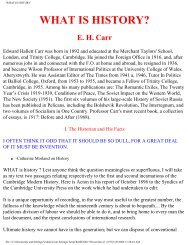The bronze age and the Celtic world - Universal History Library
The bronze age and the Celtic world - Universal History Library
The bronze age and the Celtic world - Universal History Library
You also want an ePaper? Increase the reach of your titles
YUMPU automatically turns print PDFs into web optimized ePapers that Google loves.
62 THE BRONZE AGE AND THE CELTIC WORLD<br />
Remains of such pile-dwellings have been found throughout all <strong>the</strong> mountain<br />
zone, from Geneva <strong>and</strong> Neuchatel in Switzerl<strong>and</strong>, <strong>and</strong> Annecy <strong>and</strong> Bourget in Savoy,^ to<br />
Laibach in Carniola on <strong>the</strong> edge of <strong>the</strong> Hungarian plain.* We learn, too, from classical<br />
writers that similar pile dweUings existed in Paeonia,' probably in Lake Beshika north of<br />
Salonika, as well as in Asia Minor.* This is additional proof, if that were needed, of<br />
<strong>the</strong> route by which <strong>the</strong>se people had arrived in Europe.<br />
Several anthropologists have made a study of <strong>the</strong> mental characters of <strong>the</strong>se<br />
Alpine people, <strong>and</strong>, although <strong>the</strong>se studies have been made for <strong>the</strong> most part in France,<br />
<strong>the</strong> description holds good for <strong>the</strong> inhabitants of <strong>the</strong> Alpine region. <strong>The</strong>se have thus<br />
been summed up by Ripley :'<br />
" A certain passivity, or patience, is characteristic of <strong>the</strong> Alpine peasantry. This<br />
is true aU <strong>the</strong> way from north-western Spain, where Tubino notes its degeneration into<br />
morosity in <strong>the</strong> peasantry, as far as Russia, where <strong>the</strong> great inert Slavic horde of<br />
north-eastern Europe submits with abject resignation to <strong>the</strong> pohtical despotism of<br />
<strong>the</strong> house of <strong>the</strong> Romanoffs. ... As a rule . . . <strong>the</strong> Alpine type makes a<br />
comfortable <strong>and</strong> contented neighbour, a resigned <strong>and</strong> peaceful subject. . . . <strong>The</strong><br />
most persistent attribute to <strong>the</strong> Alpine Celt is his extreme attachment to <strong>the</strong> soil, or,<br />
perhaps, better, to locahty. He seems to be a sedentary type far excellence ; he<br />
seldom migrates, except after great provocation ; so that, once settled, he clings to his<br />
patrimony through aU persecution, cUmatic or human. If he migrates to <strong>the</strong> cities,<br />
. . . he generally returns home to <strong>the</strong> country to spend his last days in peace."<br />
Ripley says that <strong>the</strong>y are socially conservative, <strong>and</strong> this is true in <strong>the</strong> sense that<br />
<strong>the</strong>y dislike change ; but an examination of <strong>the</strong> constitution of <strong>the</strong>ir vill<strong>age</strong>s leads one<br />
to beheve that <strong>the</strong>y are very democratic <strong>and</strong>, in fact, inclined to communism, though<br />
this tendency is usually confined to vill<strong>age</strong> affairs, <strong>and</strong> rarely penetrates national<br />
pohtics. It must be remembered, however, that Soviet Russia is mainly Alpine, <strong>and</strong><br />
that Marx came from <strong>the</strong> Alpine zone.<br />
3 Keller (1866) ; Munro (1890) ; Schenk {1912).<br />
4 Smid (1908), {1909) 117-126 ; o<strong>the</strong>r authorities are cited in fn. p. 118.<br />
5 Herodotus v. 16.<br />
' Hippocrates xxxvii.<br />
7 Ripley (1900) 549, 550.







